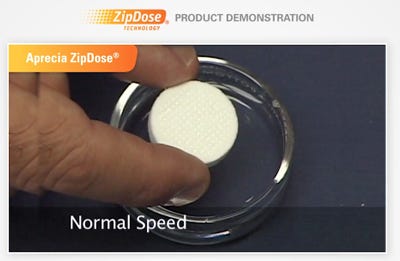A 3D printer in every pharmacy? That day may come sooner than you might think, as researchers and pharmaceuticals companies explore the possibilities of 3D printing on-demand custom drugs. One pharmaceutical scientist at University College London foresees a day when pharmacists will purchase polymer inks pre-loaded with a drug that they would then print out in the form of pills, as needed.
July 22, 2015
A 3D printer in every pharmacy? That day may come sooner than you might think, as researchers and pharmaceuticals companies explore the possibilities of 3D printing on-demand custom drugs. One pharmaceutical scientist at University College London foresees a day when pharmacists will purchase polymer inks pre-loaded with a drug that they would then print out in the form of pills, as needed. That's down the road a piece, but what you will be seeing fairly soon—later this year, in fact, if all goes according to plan—are 3D-printed drugs designed to improve patient adherence from Aprecia Pharmaceuticals (Langhorne, PA).
Aprecia's ZipDose technology adapts 3D-printing technology developed at the Massachusetts Institute of Technology (MIT) to create fast-melt products. Also called orodispersable drugs that instantly dissolve in the mouth, the technology combines the precise, convenient dosing of tablets with the swallowing ease of liquids.
|
To watch a short video demonstrating ZipDose technology, go to the |
The additive process repeatedly spreads thin layers of powdered medication on top of one another along with an aqueous binder. Polymers play a minority role in the process to help in binding and to obtain the product's mechanical properties, explains Jennifer Zieverink, Senior Director of Alliance Management. Aprecia has exclusive rights to use of the MIT 3DP technology for pharmaceutical applications.
It is hoped that fast-melt drugs will improve patient adherence to medication regimens, which is a huge problem. In approximately 50% of cases, patients do not continue to use medication as prescribed, according to the Centers for Disease Control (CDC). Non-adherence has a direct economic impact between $100 billion and $289 billion, says the CDC, and that is on an upward trajectory, given that the World Health Organization estimates that 157 million Americans will be affected by at least one chronic condition requiring medication therapy by 2020. Aprecia's ZipDose technology will improve patient adherence by making drugs easier to swallow. "Ultimately, we hope to improve adherence by alleviating medication avoidance issues related to hard-to-swallow or hard-to-administer dosage forms," Zieverink told PlasticsToday via email.
Aprecia currently is developing a product pipeline of product candidates using pharmaceuticals that are widely prescribed to treat diseases and disorders of the central nervous system and that currently are not available in fast-melt formulations. The company has filed its first New Drug Application with FDA, and it expects approval later this year. "We believe it will be the only fast-melt version of this molecule on the market," says Zieverink, who did not reveal the product. "Due to limitations with the ability of existing technologies to formulate high-dose, fast-melt pharmaceuticals, we believe that our ZipDose technology has potential broad applicability across a wide range of additional therapeutic categories," she adds.
About the Author(s)
You May Also Like





